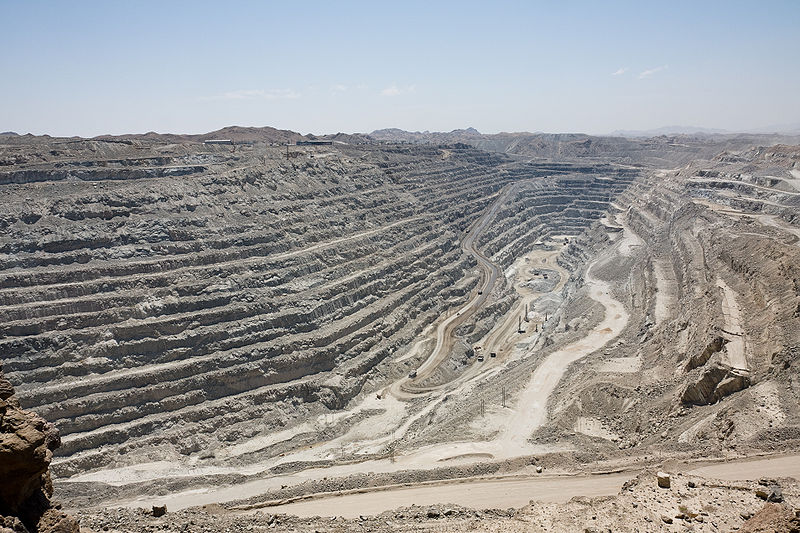China grabbing up uranium to secure nuclear lead


China is on track to build up to 100 nuclear reactors by 2030. It already has 27 of those under construction, as a path away from the polluting, CO2-emitting coal-fired plants that supply 80 percent of its electricity. The country looks likely to vault into the top position of nuclear generating nations - 100 new reactors would be nearly a quarter of the 435 nuclear power reactors that are commercially generating electricity in the world today.
Securing a supply of uranium is crucial to its - and any country's - near-term and longer nuclear future, since uranium will for some time remain the fuel that powers nuclear reactors. And that is exactly what China is doing, with trademark aggressiveness.
Today, Chinese nuclear company China Guangdong Nuclear Power Group strengthened its recently acquired control of Namibia's giant Husab uranium project by buying an additional 14.2 percent share of the mine's former owner, Australia's Extract Resources, Dow Jones is reporting.
Husab is believed to hold the world's fourth largest uranium-only deposit. Namibia is the world's fourth largest uranium producing country after Kazakhstan, Canada and Australia, according to i-Nuclear.
China Guangdong had within the last six weeks already acquired majority ownership of Extract and the Namibian site. It gained a large chunk on Feb. 7 when it acquired Kalahari Minerals plc, a British uranium and gold mining company that owned 43 percent of Extract.
China Guangdong and British mining giant Rio Tinto are also discussing jointly operating Husab and the vast Rossing uranium mine, according to an article last month by Bloomberg Businessweek. Rio owns Rossing, which is about 4 miles from Husab in western Namibia, about 45 miles from the coast.
The Indian website Firstpost cites China Daily noting that China as a whole - there are many nuclear companies in China in addition to China Guangdong - "plans to import more uranium this year and is busy scouting to buy uranium mines abroad." China already buys 95 percent of the uranium that comes from Kazakhstan, Namibia, Australia and Uzbekistan, it says. Furthermore, Canadian Prime Minister Stephen Harper recently agreed to export more uranium to China.
Canon Bryan, CEO of Vancouver-based nuclear fuel company Thorium One, pointed out to SmartPlanet that those five countries between them produce 73.5 percent of the world's uranium, and are all among the planet's top seven uranium producers.
"If China is buying all their production, where do the other 29 countries with reactors get their supply from?" asks Bryan, who is also CEO of a uranium company, Vico Energy. "Note also that when China buys uranium - or when any utility buys uranium - they do not only buy enough for a few months. They typically enter into futures contracts to buy several years of supply for at least one power station."
China's uranium grab won't matter as much to countries like Germany that have sworn (for now, anyway) to eventually disconnect nuclear power following the meltdowns at Fukushima in Japan a year ago. But countries including France, the UK, the U.S., India and others must keep a sharper eye than ever on uranium supply.
"Demand for uranium is rising as developing countries including China construct new nuclear power plants, coinciding with a deficit in supplies," Bloomberg Businessweek noted. "The price of nuclear fuel may rise 15 percent to $60 a pound this year after a slump that followed the Fukushima nuclear disaster, according to the median of the five analysts surveyed by Bloomberg."
Nuclear power countries also have another recourse: They could abandon uranium, and switch to thorium fuel, which augurs safer, less weapons prone, and more efficient nuclear reactors that do not produce the long lived and dangerous waste that uranium reactors do.
Any thorium program would require several years or more for development - although it could draw on the substantial research that took place in the 1950s and 1960s - and for regulatory approval,
But other nuclear nations need to get cracking here, too, because guess which country is squarely on the thorium advancement trail (while also building uranium reactors)? Clue: its capital is Beijing.
Photo of Rossing mine by lkiwaner. Namibia map by BlueMars. Namibia/Africa map by Alvaro1984 18. All via Wikipedia.
More nuclear future on SmartPlanet:
- Asian Super Grid: How Japan's anti-nuclear plan could go nuclear
- Fukushima's lesson: 'Alternative' nuclear, not 'no' nuclear
- Photo captures Westinghouse's nuclear knowledge flying around China
- Watch replay of nuclear's future, with dash of rare earth
- Meet the future of nuclear power: 8 guys in China
- The new face of safe nuclear
And elsewhere:
This post was originally published on Smartplanet.com